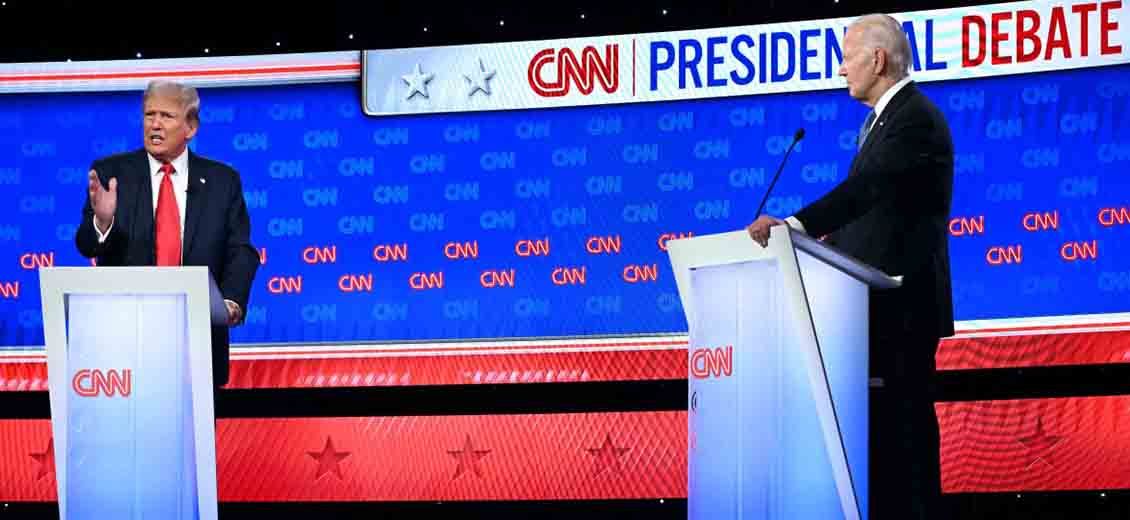- Home
- Middle East
- The Biden-Trump Rematch: Who Might Win the 2024 US Presidential Election?

©(ANDREW CABALLERO-REYNOLDS / AFP)
The 2024 US presidential election is shaping up to be a high-stakes rematch between President Joe Biden and former President Donald Trump. As the campaigns intensify, the political landscape is fraught with challenges and uncertainties that could significantly influence the outcome. The recent presidential debate and mounting pressure on the Democratic Party have further complicated the dynamics of the race, raising questions about President Biden's fitness to serve and his mental acuity.
The last presidential debate was a critical moment for both candidates. President Biden aimed to defend his administration's record while addressing concerns about his age and mental fitness. Former President Trump, on the other hand, sought to leverage these concerns to position himself as a viable alternative. The debate highlighted the stark contrasts between the two candidates' policies and personalities.
Biden focused on his achievements, such as the economic recovery post-COVID-19, the infrastructure bill, and efforts to combat climate change. However, his performance was scrutinized for signs of cognitive decline, with some observers pointing to moments of hesitation and lack of clarity. These observations have fueled ongoing debates about his ability to effectively lead for another term.
Trump capitalized on these concerns, portraying himself as the energetic and decisive leader needed to steer the country forward. He emphasized his prior administration's economic successes, border policies, and foreign relations while criticizing Biden's handling of inflation, immigration, and crime. Trump's strategy aimed to reassure his base and attract undecided voters by presenting a stark contrast to Biden's perceived vulnerabilities.
Within the Democratic Party, there is growing anxiety about Biden's candidacy. Some party members and voters are increasingly vocal about their concerns regarding his age and mental health. At 81, Biden would be the oldest president to serve a second term, and this fact has not escaped the electorate's attention. Polls indicate that a significant portion of Democratic voters are uneasy about his ability to endure the rigors of another four years in office.
These concerns have led to whispers of a potential primary challenge or a push for Biden to step aside in favor of a younger, more dynamic candidate. Figures like Vice President Kamala Harris, Secretary of Transportation Pete Buttigieg, and California Governor Gavin Newsom are frequently mentioned as possible alternatives. However, such a move carries risks, potentially fracturing the party and undermining its chances in the general election.
Voter sentiment is a critical factor in the upcoming election. The issue of Biden's fitness to serve is not confined to partisan lines; it resonates with a broader swath of the electorate. Many voters, including some who supported Biden in 2020, are now expressing doubts about his ability to handle the demands of the presidency. These concerns are often amplified by media coverage and political rhetoric, creating a challenging environment for the Biden campaign.
Republicans are capitalizing on this narrative, with Trump and his allies frequently questioning Biden's cognitive abilities. This strategy aims to sway swing voters and independents who might be on the fence. The portrayal of Biden as a weak and declining leader is central to the Republican messaging, which seeks to contrast Trump's vigor and assertiveness with Biden's perceived frailty.
For Trump, the path to victory hinges on consolidating his base, winning over undecided voters and exploiting Biden's vulnerabilities. Trump's base remains steadfastly loyal, driven by a combination of ideological alignment, charismatic appeal, and grievances against the political establishment. To expand his support, Trump must address the concerns of moderate Republicans and independents who may have reservations about his past conduct and polarizing rhetoric.
Trump's campaign is likely to focus on key battleground states that were pivotal in the 2020 election. States like Pennsylvania, Michigan, and Wisconsin will once again play a crucial role in determining the outcome. Mobilizing voters in these regions and addressing local issues will be essential for Trump to secure a win.
External factors such as the state of the economy, global events, and unforeseen crises will also influence the election. Economic conditions can sway voter perceptions and priorities. If the economy remains strong, Biden could argue that his policies are working, bolstering his case for re-election. Conversely, economic downturns or crises could amplify criticisms of his administration and benefit Trump's campaign.
Global events, such as conflicts, trade disputes, or international crises, can also shift the narrative. Trump's foreign policy record and Biden's handling of current international challenges will be scrutinized by voters seeking stability and strong leadership on the global stage.
As the 2024 election approaches, the contest between President Biden and former President Trump is shaping up to be a defining moment in American politics. The recent presidential debate, coupled with mounting pressure on the Democratic Party and concerns about Biden's fitness to serve, has created a complex and volatile political landscape. Voter sentiment, external factors, and the strategic maneuvers of both campaigns will ultimately determine who will emerge victorious in this high-stakes rematch. Regardless of the outcome, the election will have profound implications for the future direction of the United States.
Read more



Comments